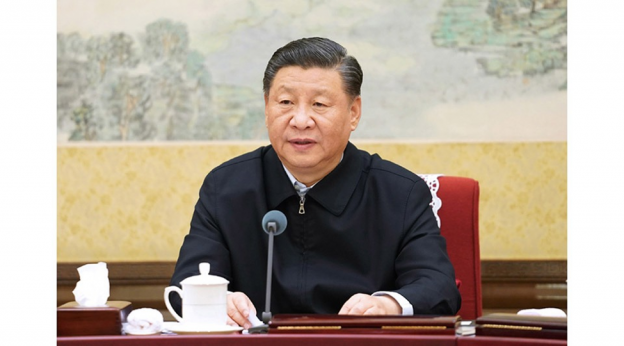As political pressure mounts over China’s poor handling of the ongoing Covid-19 virus epidemic, the leadership in Beijing contemporaneously faces a number of major public policy challenges. President Xi Jinping has embarked on an ambitious plan for hegemonic domination of East Asia in the short-term. Later he expects to force recognition of China as the great power among major world nations. It is an ambitious embarking. Since assuming full power in 2012 Xi has ordered the leaders of various Chinese Communist Party (CCP) organs and governmental departments to develop and deploy artificial intelligence to construct his vision of a 21st century surveillance state, not unlike something one might read about in a Kurt Vonnegut fantastical, short story about dehumanizing alien societies and civilizations.
The military, which only a few decades ago was training with wooden sticks in place of actual guns, today commands some of the most advanced offensive weaponry available. Under Xi, China has demonstrated its weaponization of space with directed energy weapons and satellite jammers capable of interfering with sensitive, in theater, US military operations. On the high seas China deploys a blue water navy capable of traversing under the polar ice caps and limiting freedom of navigation in much of the South and East China Seas.
Just a year ago in the South Pole-Aitken Basin area of the moon, China’s military landed an unmanned spacecraft making it the first nation to achieve a landing on the “dark side.” It was part scientific and part propaganda coup. As Liu Jizhong, of China’s Lunar Exploration and Aerospace Engineering Center, told Agence France-Press, “The implementation of the Chang’e 4 mission has helped our country make the leap from following to leading.” It is this leap that greatly concerns the United States and other western nations striving for a more free, safe, and prosperous global environment. What President Xi and the CCP have failed to demonstrate is their ability to govern China as a modern nation-state and follow the norms of acceptable international behavior.
In a recent speech this week in Washington US Defense Secretary Dr. Mark T. Esper talked about how China is achieving these gains and what it is costing free people everywhere. He said that President Xi is using direct state investment, forced technology transfer and intellectual property theft to skip the generations of investment and learning normally needed to achieve these scientific advancements. Chinese economic espionage and theft of American intellectual property has dramatically expanded in recent years. Esper added: “Beijing is determined to exploit American intellectual property and know-how at any cost.”
It is this “at any cost” attitude that is most concerning to world leaders. Despite global outrage at China’s behavior it continues down the same path. Feigned attempts to hold China accountable by previous American administrations failed to slow China’s avarice for stolen technology. Finally, in 2018, under the Trump Administration crackdown on the country, the US Justice Department filed more than a half dozen charges in separate economic espionage cases and secured convictions and guilty pleas in six more. It still represents only a small indent in illicit Chinese efforts. Hackers daily target prime US technology companies, government, and academia in attempts to siphon off the latest intellectual property in development. Xi and other Chinese leaders often attempt to justify the thievery by referring to the Unequal Treaties period in Chinese history, from about 1839 to the early 20th century, in which many western nations forced China to sign treaties and agreements conceding its territory and sovereignty rights to those foreign powers.
Underlying Xi’s modernization strategy is his visceral need to restore China to its rightful place in the world, as he defines it. The effort includes the national-level expansion of his “Military-Civil Fusion Strategy” or MCF. It effectively creates a robust military-industrial complex obscuring the distinction between military and civilian knowledge, research, and production. The danger to other nations is real. By adopting and reengineering new products from acquired foreign systems China can simultaneously harness both sectors for national defense technology advancements.
The expanded strategy is not new. Sometimes foreign firms helped China. In 2003 the Chinese Computer World Army-Supporting Alliance on Science and Technology, with the assistance from at least four US firms, provided the People’s Liberation Army (PLA) with $4.5 million USD in IT equipment. Defense Secretary Esper says the United States cannot continue to allow American firms to support Chinese exploitation of our intellectual resources in light of Xi Jinping’s aggressive global agenda. MCF is a 21st century whole-of-government effort to redesign China’s defense innovation ecosystem. President Xi has taken on many political challenges and, to date, won the majority of those contests. His global agenda, however, may be raising the stakes so high that any lapse in progress, whether from the Covid-19 epidemic or the Trump Administration’s trade war, may be enough to dislodge him from the legacy he seeks to secure. This year’s challenges may prove to undermine the stability Xi and the CCP have fought so hard to maintain at the cost of freedom and domestic innovation. Losing is not an acceptable option for the Chinese leadership.
DARIA NOVAK served in the United States State Department during the Reagan Administration, and currently is on the Board of the American Analysis of News and Media Inc., which publishes usagovpolicy.com and the New York Analysis of Policy and Government. Each Friday, she presents key updates on China.
Photo: Xi addresses virus crisis (China gov. official photo)
